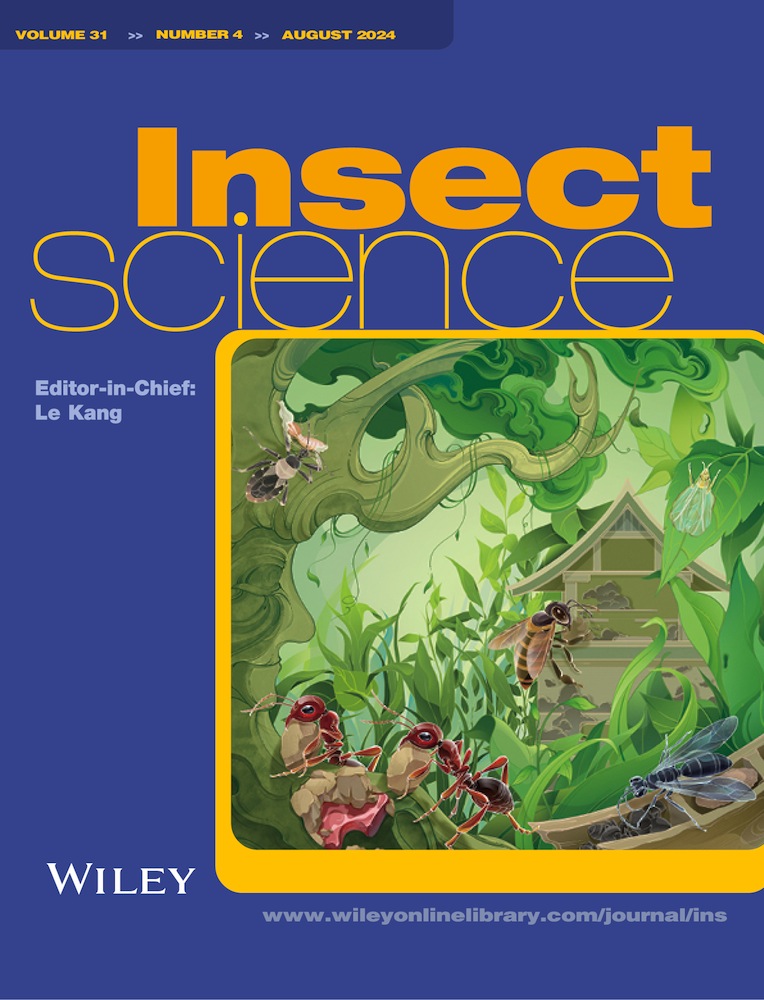miR‐927 regulates insect wing development by targeting the Hippo pathway
IF 2.9
1区 农林科学
Q1 ENTOMOLOGY
引用次数: 0
Abstract
How organ size is determined is a fundamental question in life sciences. Recent studies have highlighted the importance of the Hippo pathway in regulating organ size. This pathway controls cell proliferation and cell death to maintain the proper number of cells. The activity of the Hippo pathway is tightly fine‐tuned through various post‐translational modifications, such as phosphorylation and ubiquitination. Here, we discover that miR‐927 is a novel regulator of wing size. Overexpression of miR‐927 decreases wing size, which can be rescued by co‐expressing miR‐927‐sponge. Next, we show that miR‐927 stimulates apoptosis and suppresses the expression ofmiR-927 通过靶向 Hippo 通路调控昆虫翅膀的发育
器官大小如何决定是生命科学的一个基本问题。最近的研究强调了 Hippo 通路在调节器官大小中的重要性。该通路控制细胞增殖和死亡,以维持适当的细胞数量。Hippo 通路的活性通过磷酸化和泛素化等各种翻译后修饰进行严格的微调。在这里,我们发现 miR-927 是翅膀大小的新型调节因子。过表达miR-927会减小翅膀的大小,而通过共表达miR-927-sponge可以挽救这种减小。接下来,我们发现 miR-927 能刺激细胞凋亡,抑制果蝇凋亡抑制蛋白 1(Hippo 通路的一个著名靶基因)的表达。遗传表观分析将 miR-927 定位在约基(Yki)的上游,以调节 Hippo 通路。此外,在 Yki 3′ 非翻译区(3′-UTR)有一个匹配的 miR-927 种子位点,我们证明了 Yki 3′-UTR 是 miR-927 的直接靶标。最终,我们的研究发现,miR-927 以 yki 为靶标调控 Hippo 通路在 Helicoverpa armigera 中是保守的。通过星状多聚阳离子(SPc)纳米载体施用 miR-927 能有效地抑制 Helicoverpa armigera 翅膀的发育。综上所述,我们的发现揭示了 miR-927 在转录后水平沉默 Yki 的新机制,为害虫管理提供了新的视角。
本文章由计算机程序翻译,如有差异,请以英文原文为准。
求助全文
约1分钟内获得全文
求助全文
来源期刊

Insect Science
生物-昆虫学
CiteScore
7.80
自引率
5.00%
发文量
1379
审稿时长
6.0 months
期刊介绍:
Insect Science is an English-language journal, which publishes original research articles dealing with all fields of research in into insects and other terrestrial arthropods. Papers in any of the following fields will be considered: ecology, behavior, biogeography, physiology, biochemistry, sociobiology, phylogeny, pest management, and exotic incursions. The emphasis of the journal is on the adaptation and evolutionary biology of insects from the molecular to the ecosystem level. Reviews, mini reviews and letters to the editor, book reviews, and information about academic activities of the society are also published.
 求助内容:
求助内容: 应助结果提醒方式:
应助结果提醒方式:


